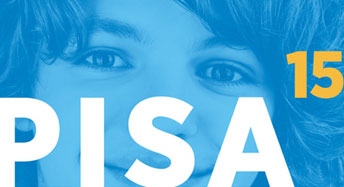PISA 2015: Finnish youth among the best in collaborative problem solving

Young people in Finland ranked in fifth place among the OECD countries that took part in the OECD’s PISA 2015 assessment on collaborative problem solving and in seventh place among all the countries and economies that participated in the assessment. This is the first time that collaborative problem-solving skills were assessed.
– The assessment shows that young people in Finland have good collaborative and problem-solving skills. This reaffirms that we have good fundamental conditions, basic knowledge and also basic skills to cope with the transformation of work, where the ability to collaborate and create new things in networks and teams is highlighted. The new core curricula in basic education focus more closely on strengthening the skills required in the future. The only element that raises concern in this assessment is the poor performance of boys. I have invited the researchers to find solutions for this weak point in our educational system,’ says Minister of Education Sanni Grahn-Laasonen.
The average score points for Finnish students amounted to 534 points, and only the average score points of Singapore (561 points) and Japan (552) differed statistically significantly. The average score points for students in Hong Kong (541), Korea (538), Canada (535), Estonia (535), Macao (534), New Zealand (533) and Australia (531), were in the same category as Finland. The score points for students in Japan were higher than the rest of the OECD countries. There was no statistically significant difference in the score points between Korea, Canada, Estonia and Finland.
Collaborative problem solving refers to the ability to act effectively in a situation where a group of people attempt to solve a problem by exchanging information, skills and understanding among themselves. Reading skills and engagement in discussion are highlighted in collaborative problem solving. The countries that performed well in this assessment generally also performed well in other areas of the PISA survey.
The students performed the assessment interactively in a digital environment, where they communicated, using chat windows, with computer agents representing one or more students. To succeed, the students had to choose the options to take the floor that best supported collaboration constructively.
Small differences in socio-economic background, large gender gap
The results show that the Finnish educational system is equitable in the way it helps students learn problem-solving skills. Differences between schools were the second smallest in Finland after Iceland, and the impact of the student’s socio-economic background on collaborative problem-solving outcomes was minimal compared with the rest of the best-performing countries. Among the top ten, only the socio-economic background of students in Macao accounted for less of the variance in the results than in Finland.
The PISA 2015 survey results published in late 2016 covering the three core domains (reading, mathematics and science) showed regional differences in performance in Finland for the first time ever. However, the differences in the area of collaborative problem solving were much smaller than in the other domains and were for the most part not statistically significant.
Girls performed uniformly better than boys around the world, and nowhere was the gap in performance between the genders as wide as in Finland. The observation made in earlier PISA surveys that the performance of boys is poorer is reiterated in collaborative problem solving too.
Finnish-speaking schools performed better in the assessment than did Swedish-speaking ones. As in the rest of the domains in the PISA survey, students with an immigrant background did not perform as well in collaborative problem solving as did other students.
Altogether 73 countries and economies participated in the PISA 2015 assessment
PISA 2015 is the sixth survey in the OECD Programme for International Student Assessment. It was first performed in 2000 and then repeated every three years and it assesses performance in reading, mathematics and science. The PISA 2015 outcomes for reading, mathematics and science were published on 6 December 2016.
A new, innovative fourth content domain has been incorporated since 2012, which in 2015 was collaborative problem solving. Of the 73 countries and economies that participated in the PISA 2015 survey, 51 also took part in a collaborative problem-solving assessment.
The PISA 2015 survey in Finland was carried out by Jyväskylä University Finnish Institute for Educational Research and Helsinki University Centre for Educational Assessment Consortium. The participants of the survey were 15-year-old students.
– The results related to educational equity are all positive apart from the ever wider gap in skills between boys and girls, which is concerning. The tasks in collaborative problem solving stress reading skills, and tasks performed in a chat-based platform undoubtedly also have a bearing on the results. But literacy does not fully explain the gender gap. There is clearly more to it. So we must continue to systematically explore the boys’ situation more thoroughly and identify effective ways for improvement, says Mari-Pauliina Vainikainen, research coordinator at the University of Helsinki.
– Assessing collaborative problem solving in a broad assessment brings an entirely new area into the field of assessment. Technology-oriented assessment broadens the spectrum of skills and knowledge being assessed, which might also generate an increase in innovative methods in teaching, says Arto Ahonen, national coordinator for the PISA survey at the University of Jyväskylä.
- Summary of Finland's PISA 2015 outcomes on collaborative problem solving and more information
- All PISA 2015 outcomes on the OECD’s webpages
Inquiries:
Ministry of Education and Culture
- Tommi Karjalainen, Senior Ministerial Adviser, tel. +358 2953 30140
- Eeva-Riitta Pirhonen, Director General, tel. +358 2953 30258
- Daniel Sazonov, Special Adviser, tel. +358 45 129 6812
University of Helsinki:
- Mari-Pauliina Vainikainen, Research Coordinator, tel. +358 50 318 2188
- Professor Jarkko Hautamäki, tel. +358 50 318 2183
- Sirkku Kupiainen, Coordinator (educational assessment) tel. +358 50 318 2190
University of Jyväskylä
- Arto Ahonen, Researcher, PISA national coordinator, tel. +358 40 893 4209

